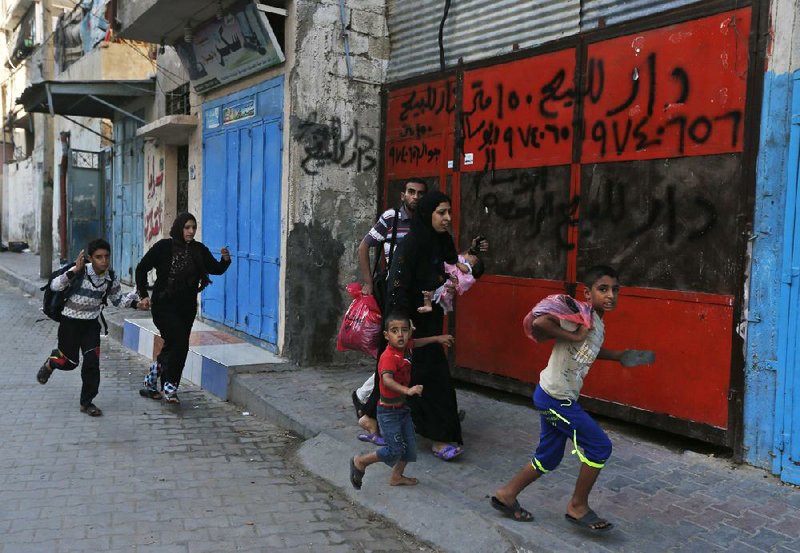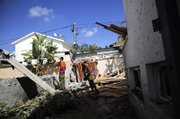GAZA CITY, Gaza Strip -- Israel and Hamas agreed to a five-hour "humanitarian" pause in their 9-day-old battle that has killed more than 200 Palestinians, including four boys struck on a beach Wednesday by shells fired from an Israeli navy ship.
Israel said it would hold its fire today from 10 a.m. Jerusalem time under a United Nations-brokered plan to allow Palestinians to restock food, water and other necessities. But it vowed to retaliate "firmly and decisively" if Hamas or other militant groups launch attacks on Israel during that time.
Later, Hamas spokesman Sami Abu Zuhri said that after consultations with various factions, the Gaza militants had decided to respect the pause, as well, and would refrain from firing rockets during those hours.
Robert Serry, the U.N. special coordinator for the Middle East peace process, had asked Israel to agree to a "unilateral humanitarian pause" so the supplies could be delivered to Gaza, said U.N. deputy spokesman Farhan Haq.
Israel previously had halted its fire for six hours Tuesday after Egypt put forward a cease-fire proposal that then unraveled. Hamas official Sami Abu Zuhri said Wednesday that his group had formally rejected the plan, bemoaning what he called little support from the Arab world.
But Palestinian President Mahmoud Abbas met Wednesday in Cairo with a senior official from Hamas to try to salvage the Egyptian proposal.
In Washington, President Barack Obama said the U.S. supports Egypt's continued efforts to restore the 2012 cease-fire and will use all of its diplomatic resources and relationships to secure a deal to end the violence.
Obama said Israel has a right to defend itself against rocket attacks but also lamented the deaths of civilians in Gaza. He stressed the need to protect civilians in Gaza and in Israel and to avoid further escalation.
"There's no country on Earth that can be expected to live under a daily barrage of rockets," Obama said. "But over the past two weeks, we've all been heartbroken by the violence, especially the death and injury of so many innocent civilians in Gaza -- men, women and children who were caught in the crossfire. That's why we have been working with our partners in the region to pursue a cease-fire, to protect civilians on both sides."
Israel's military said its forces bombed at least 150 targets in Gaza on Wednesday. It did not provide more specifics, but the Gaza Interior Ministry's website said 30 houses, including those of senior Hamas leaders Mahmoud Zahar, Jamila Shanti, Fathi Hamas and Ismail Ashkar, were targeted.
Zahar was a key figure in Hamas' violent takeover of Gaza in 2007, while the other three were members of the Palestinian parliament elected in 2006. Many Hamas leaders have gone into hiding since Israel began its bombardment July 8 in response to rocket attacks from Gaza.
Gaza health official Ashraf al-Kidra said the Palestinian death toll rose to 222, with 1,670 wounded. According to a running count kept by United Nations officials, about 75 percent of those killed have been civilians.
Only one Israeli has so far died in the conflict -- a civilian distributing food to soldiers in southern Israel on Tuesday evening -- largely because of the effectiveness of Israel's Iron Dome air defense system in downing incoming rockets.
The four Palestinian boys, who were cousins aged 9 to 11, were killed on the beach beside a coastal road west of Gaza City, al-Kidra said. Seven others -- adults and children -- were wounded in the strike, which Palestinian human-rights activist Khalil Abu Shamalla and health officials said came from an Israeli naval vessel.
Hussam Abadallah, a waiter at the beachside al-Deera hotel, said he saw "white smoke coming from a small room, like a shack, belonging to one of the fishermen not far from the fishing port."
He said he then saw the boys running.
"We started shouting at them, 'Run, run here,' then a shell from the sea landed behind them," Abadallah said.
Some journalists dining at the hotel jumped from the terrace and helped five children bleeding from shrapnel get to safety in the hotel, he added.
"I will never forget these horrible images," Abadallah said.
The Israeli army said in a statement it was "carefully investigating" the matter. It said the target of the naval attack was "Hamas terrorist operatives" and that civilian casualties were "a tragic outcome."
It said the army "has no intention of harming civilians dragged by Hamas into the reality of urban combat."
The boys' uncle, Abdel Kareem Baker, 41, raged at Israel after the attack.
"It's a coldblooded massacre," he said, adding that the Israelis should have known their victims were children "with all of the advanced technology they claim they're using."
Al-Kidra, the Gaza health official, said another airstrike in the Gaza neighborhood of Khan Younis killed four members of the Al-Astal family, including a 6-year-old boy, his 4-year-old sister, and a 70-year-old woman.
In a separate airstrike, a woman and a young girl were killed, al-Kidra said.
Likelihood of Invasion
A senior Israeli military official said Wednesday that the likelihood of a ground invasion into Gaza was "very high."
"If you want to efficiently fight terrorism, you must be present, boots on the ground," said the official, who has been briefing Israeli ministers who make strategic decisions. He said his assessment was based on "the signals I get" and the diminishing returns of aerial bombardments.
"Every day that passes makes the possibility more evident," the official told a handful of international journalists in a briefing at the military's Tel Aviv headquarters. "We can hurt them very hard from the air but not get rid of them." He spoke on the condition of anonymity under military protocol.
Israel's security Cabinet on Wednesday approved a call-up of 8,000 additional reservists, according to another Israeli official, who spoke on condition of anonymity because he was not permitted to discuss the matter publicly. The army said 45,000 reservists had already been summoned.
With Israeli troops prepared for a possible ground invasion, Prime Minister Benjamin Netanyahu said Wednesday that his country's top mission is to rid the Hamas-ruled Gaza Strip of its weapons.
Netanyahu said Hamas carries sole responsibility for the continued violence after rejecting the Egyptian truce plan Israel accepted briefly Tuesday before resuming airstrikes as rocket fire continued on its communities from Gaza.
"The most important thing vis-a-vis Gaza is to ensure that Gaza is demilitarized," he said.
Netanyahu has said Hamas would pay a high price for rejecting the Egyptian plan.
Hamas's military wing called the proposal an "initiative of subordination and submission."
Abu Zuhri, the Hamas spokesman, said the group hadn't officially "received any initiative from anyone" and rejected the concept of "ceasing fire before reaching an agreement."
Abbas met with deputy Hamas chief Moussa Abu Marzouk to discuss the Egyptian initiative. An official with Abbas' Fatah faction said Abbas and Egypt were trying to get Hamas on board.
Egypt's cease-fire plan seeks to restore greater authority for Abbas in Gaza and settle rifts between the Palestinian Authority and Hamas, which took control of the seaside territory in 2007, according to a Palestinian official in Cairo. The official spoke on condition of anonymity because he wasn't authorized to release information about the private talks.
Under the proposal, a cease-fire would be followed by talks to resolve the rift between Hamas and Abbas over Gaza, including giving control of the border to Abbas, he said. That would presumably allow a greater opening of the borders, one of Hamas' main demands, along with the easing of border closures and the release of former Hamas prisoners who had been freed by Israel in a 2011 prisoner exchange but were rearrested by Israel last month in the West Bank.
The official, who was in Cairo, said Hamas' main objection was the power-sharing arrangement.
The militant group views a significant easing of the Israeli blockade of Gaza as key to its survival but does not believe that Egypt's current rulers -- who deposed a Hamas-friendly government in Cairo last year -- can be fair brokers.
Get out, Israel warns
Israel on Wednesday told tens of thousands of residents of the northern town of Beit Lahiya and the Zeitoun and Shijaiyah neighborhoods of Gaza City, all near the border with Israel, to evacuate their homes.
The Israeli military said in automated phone calls, text messages and airdropped leaflets that large numbers of rockets were launched from those areas and that it planned to bomb the locations.
"Whoever disregards these instructions and fails to evacuate immediately, endangers their own lives, as well as those of their families," the message said.
As a result, hundreds of residents of Zeitoun and Shijaiyah were seen walking in the streets, carrying small bags with belongings. Many people appeared confused, with some seeking shelter in friends' homes deeper inside the neighborhoods rather than leaving.
"We don't know where we're going, we're going aimlessly," said Mohammed Dalul, who was driving a donkey cart with his six children and an elderly neighbor. They had with them only a canister of cooking gas and a single bag of clothes for the children.
"Nobody is looking after us," said the neighbor, Naziha Rukhneh.
The Wafa Rehabilitation Center in Shijaiyah, which cares for 15 disabled and elderly patients, received several calls demanding the patients evacuate, said its director, Basman Ashi.
An Israel shell hit near the building, damaging the second floor but causing no injuries, he said. Ashi added that his patients have nowhere to go.
Four foreign volunteers -- from Britain, the U.S., France and Sweden -- have set up camp at the rehabilitation center to deter the military from targeting it.
British volunteer Rina Andolini, 32, said the patients range in age from 12 to over 70, and none can walk or move without assistance. She said there are also 17 Palestinian staff members.
The patients are living in constant fear, intensified by the Israeli tank shelling from across the border, she said.
When asked about the situation at the rehabilitation center, the office of the Israeli military spokesman said its residents "have been asked repeatedly to leave."
"There is a rocket-launching site in the area," the military said, adding that Gaza militants use the center to hide "behind civilians."
Information for this article was contributed by Ibrahim Barzak, Daniel Estrin, Peter Enav, Yousur Alhlou, Sarah El Deeb, Josh Lederman and Deb Riechmann of The Associated Press; by Anne Barnard, Tyler Hicks, Fares Akram, Jodi Rudoren and Isabel Kershner of The New York Times; and by Calev Ben-David, Saud Abu Ramadan, Jonathan Ferziger and Caroline Alexander of Bloomberg News.
A Section on 07/17/2014



